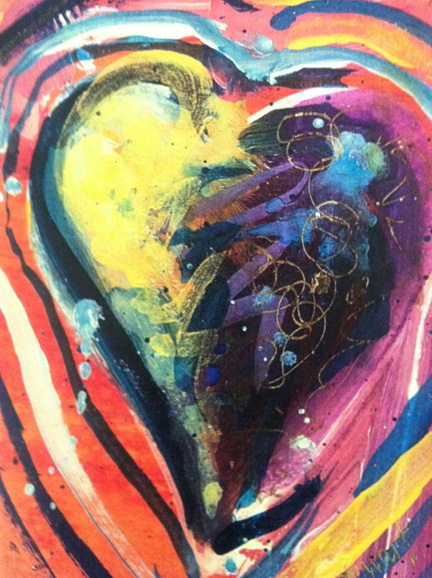Feast of the Sacred Heart 2011
Whose feast is this anyway?
A reflection on the readings for the Solemnity of the Sacred Heart
“Moses said to the people: ‘You are a people sacred to the Lord, your God…’” Those are the first words of today’s first reading and I was immediately captivated by them. On this Feast of the Sacred Heart, the readings have Moses announce to the assembly that it is they who are sacred. It made me ask the question: whose feast is this anyway? If we are sacred to the Lord our God then so are our hearts “sacred hearts.” It was an amazing thought to me and remains so.
Today’s readings actually tell us something about God’s heart and something about the heart of Christ and therefore ultimately something about our own “sacred hearts” and how we, too, are called to love. I’d like to look at all three of these realities.
First: God’s heart. The psalm appointed for this day is full of descriptive words about the heart of God: God is the one who pardons and heals us, the one who redeems us from destruction, who crowns us with kindness and showers us with compassion. God, we are told, is merciful and gracious, slow to anger, abounding in kindness. Add to these qualities the words of Deuteronomy declaring God’s preference for “the smallest of all the nations.” God, it would seem, has a certain predilection for those who are weak, for those who suffer, for those on the edges of society, and for those who aren’t anybody very important in their own eyes. And Deuteronomy also declares that from whatever it is that binds us, fear, old hurts, addictive behavior, or patterns of sinfulness… From all of these places of slavery God’s strong hand and steady heart will free us and will fill us with gifts out of love and faithfulness.
There is a part of the Deuteronomy reading, however, that doesn’t ring true—at least for me. It is the section about vindictiveness: “God will repay with destruction the person who hates God … for God does not dally with such people but makes them personally pay for it.” We generally pass over such language in our homilies for we are stunned by it, surprised, perhaps even repelled. But here is where the limitations of the first testament are so clear. The God of Deuteronomy was a God equally of mercy and might, of victory and vindictiveness, sometimes of “eye for an eye” retribution and repayment. But that is not the God we know—not because we wish to gloss over the hard saying of the Scriptures but because we know God most truly through the transparent revelation of Jesus.
The Heart of Christ then, on this feast, is raised up for us as the human embodiment of who God is and of all of God’s longings. That is the promise in the second reading: ‘God’s heart is revealed in our midst in this way, for Christ is God’s perfect revelation and the source of all life and holiness for us.’ Or, to use words from John’s prologue: it is the Son who is closest to God’s heart who has made God known, who has, if you will, corrected the images of retribution and vindictiveness—for the heart of the Son—his sacred heart—was incapable of such violence.
The opening prayer for this feast captures perfectly this quality of the Heart of Christ. It describes a “heart broken by human cruelty yet symbol of love’s triumph.” In the face of the violence of others, in the face of misunderstanding and rejection, in the face of the obvious limitations of his first followers, in the face of the chasm between his own soaring hopes and the realities of everyday life, in the face of his longing to make God known and the indifference with which his teaching was so often met, Christ’s heart must have been broken again and again. Surely he felt these responses deeply; surely he knew the taste of failure, surely the words and actions of others were heart-breaking for him. But despite all this, in Christ, love triumphed again and again.
And what of our hearts, our sacred hearts—for that is what they are. “If we love one another God dwells in us and God’s love is brought to perfection in us.” The heart of Christ is the pledge of all that we are called to be. Daily as we allow God’s heart free reign in us and know God’s longings for our world our hearts become more precious repositories of God’s love. Daily as we allow our hearts to be broken—broken-open as was Christ’s heart—by the sufferings within us and around us yet respond only with love our hearts, too, become transparent revelation of the love of Christ. Daily as we allow God to purify us of all that is not true to the thoughts of God’s heart for every generation we become more faithful to the mission we have each embraced: to make known God’s love to a world so in need of healing and hope.
Hear again the words of the opening prayer:
God of our Lord Jesus Christ,
we honor the heart of your Son,
broken by human cruelty
yet symbol of love’s triumph
pledge of all that we are called to be.
Teach us to see Christ in the lives we touch
and to offer him living worship
by love-filled service to our sisters and brothers.
On this feast, as every year since the Society began, let us join with one another and our associates and friends all over the world, members of the family of God’s heart, and offer our selves, our lives, our truly sacred hearts as living worship.
~ Kathleen Hughes, RSCJ
